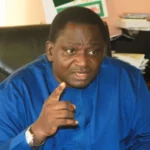Today Catholics all over the world celebrate the Solemnity of Christ the Universal King. This feast marks the end of the liturgical cycle. And from next week, we will be turning a new leaf into another, of the church’s liturgical year. For the sake of my readers who are not Catholics. Let me briefly explain. The entire Bible is divided into three cycles. A, B, C: In three years, a faithful reader of the daily readings would have read the entire Bible, with ease. The feast of Christ the king marks the end of each liturgical cycle.
The Solemnity of Our Lord Jesus Christ, King of the Universe, commonly referred to as the Feast of Christ the King, or Christ the King Sunday is a relatively recent addition to the Western liturgical calendar, having been instituted in 1925 by Pope Pius XI for the Roman Rite of the Catholic Church. In 1970 its Roman Rite observance was moved to the final Sunday of Ordinary Time. Therefore, the earliest date on which it can occur is 20 November and the latest is 26 November. The Anglican, Lutheran, and many other Protestant churches also celebrate the Feast of Christ the King, which is contained in the Revised Common Lectionary.
- Nine ABU French students regain freedom
- Zamfara peace initiative: Gov. Matawalle secures unconditional release of 11 kidnap victims
According to Cyril of Alexandria: Christ has dominion over all creatures, by essence and by nature. His kingship is founded upon the hypostatic union The Word of God, as consubstantial with the Father, has all things in common with him, and therefore has necessarily supreme and absolute dominion over all things created.
From this it follows that to Christ angels and men are subject. Christ is also King by acquired, as well as by natural right, for he is our Redeemer. We are no longer our own property, for Christ has purchased us with a great price; our very bodies are the members of Christ. A third ground of sovereignty is that God bestowed upon Christ the nations of the world as His special possession and dominion. “All power in heaven and on earth has been given to me” (Matthew 28:18).
The Feast of Christ the King has an eschatological dimension pointing to the end of time when the kingdom of Jesus will be established in all its fullness to the ends of the earth. It leads into Advent, when the Church anticipates Christ’s second coming. We commemorate Jesus who is king over all the earth. In Mathew 25: 31-46: Jesus gave a beautiful story of the judgment day by the king when he returns. “Then the king will say to those at his right hand, “Come, O blessed of my Father, inherit the kingdom prepared for you from the foundation of the world, for I was hungry and you gave me food, I was thirsty and you gave me drink, I was a stranger and you welcomed me, I was naked and you clothed me, I was sick and you visited me. I was in prison and you came to me” (Mathew 25: 33.37). When the faithful servants received these encomium from the king. They expressed surprised at the king and asked, when exactly did they offer to him all these kind gestures? And he replied with these words that are filled with wisdom and inspirations. “Whatsoever you do for the least of my brothers you do unto me” (Mathew 25: 40).
Kings are traditionally associated with pomp and pageantry; wars, empires and kingdoms. In 2 Samuel 5:1-10, David was anointed King of Israel. In the history of the Jews, David is one of the most revered kings, because he fought numerous battles and won. He destroyed one of Israel’s most dreaded enemies; Goliath. (2nd Samuel) David unified the Northern and Southern Kingdoms, and under him, there was some level of peace, or rather freedom from wars.
The pomp and pageantry that were and are still associated with both ancient and modern kings have never been associated with the life and style of Jesus. Jesus’ kingship completely unsettled all we ever understood about power, authority and kingship. In Jesus we see a king whose emphasis is service over command and control. The solemnity of Christ the universal king reminds us of the importance of serving him in one another.
As I prepared for this reflection I took some time off to visit the graves of two powerful ‘kings:’ a former Head of State and a former President of the federal Republic of Nigeria, General Sani Abacha and Umaru Musa Yar Addu’a respectively. These men remind me of the Oratory of Santa Maria dell’Orazione e Morte (Holy Mary of Prayer and Death) in Rome that has thousands of Skulls in its crypt: One of the skulls has this engraving: hodie mihi, cras tibi. Today me tomorrow you. As I watched the graves of the former Head of State and President, I remembered how these men once had over two hundred soldiers guarding them while they were alive. I remembered how all flights are delayed because the President is about to land or take off. As I watched their graves I could imagine the skeletons that remains in the earth. Nobody is there to guard the skeleton of the king. How empty and useless, our craving for earthly power and glory can be most times.
The solemnity of Jesus as the universal king teaches us all the ephemerality of earthly power. For many, that is all that matters. Power!!! At the end of time, faithful servants were rewarded for simply visiting prisoners, feeding the hungry, clothing the naked. It is instructive to note that Jesus did not specify the type of poor people to feed or the tribe of the prisoners to visit, or the religion of the hungry that needs to be fed. He simply said. Whatsoever you do to the least of my brothers you do unto me.
Nigeria like many other nations would fail this test of treating people for who they are. Most times people would treat others for what they have and how much they are worth. For example, a convicted person would be regarded as a less citizen or even a nonentity. In fact, some countries do not offer job opportunities for ex-convicts. In the eyes of the people they deserve no more chance. But how would Jesus treat ex-convicts and their likes? How would the King treat the “basket of the deplorable” in our midst? Stephen Covey in his book. The Seven Habits of Highly Effective people; enumerated seven habits, that account for the positive energy and results in the lives of some individuals we term successful. The second Habit should help us to always remember the skeleton in the kings.
The second habit talks about Beginning with the End Mind: See yourself driving going to the funeral of a loved one. Picture yourself driving to the funeral parlor or chapel, parking the car, and getting out. As you walk inside the building, you notice the flowers, the soft organ music. You see the faces of friends and family you pass along the way. You feel the shared sorrow of losing, the joy of having known, that radiates from hearts of the people there. As you walk down to the front of the room and look inside the casket, you suddenly come face to face with yourself. This is your funeral, three years from today. All these people have come to honor you. To express feelings of love and appreciation for your life.
As you take a seat and wait for the services to begin, you look at the program in your hand. There are to be four speakers. The first is from your family, immediate and also extended – Children, brothers, sisters, nephews, nieces, aunts, uncles, cousins, and grandparents who have come to attend. The second speaker is one of your friends, someone who can give a sense of what you were as a person. The third speaker is from your work or profession. And the fourth is from your church or some community organization where you’ve been involved in service.
Now think deeply. What would you like each of these speakers to say about your life? What kind of husband, wife, father, or mother would you like their words to reflect? What kind of son or daughter or cousin? What kind of friend? What kind of working associate? What character would you like them to have seen in you? What contributions, what achievement would you want them to remember? Look carefully at the people around you. What difference would you like to have made in their lives? Would Christ say to you whatsoever you do to the least of these people you are sitting next to, you actually did it to me? Let us be kings who serve others, come rain come shine. At the end, our skeletons will certainly remain without guards, wealth, pomp and pageantry. Jesus, the universal king reminds us that the only treasure we carry beyond this life is the charity, which we demonstrate to people in need. “Whatsoever you do to the least of my brothers that you do unto me,” says Jesus.
Fr Stephen Ojapah is a priest of the Missionary Society of St Paul. He is equally the director for Interreligious Dialogue and Ecumenism for the Catholic Diocese of Sokoto, a member of IDFP. He is also a KAICIID Fellow. ([email protected])
 Join Daily Trust WhatsApp Community For Quick Access To News and Happenings Around You.
Join Daily Trust WhatsApp Community For Quick Access To News and Happenings Around You.


